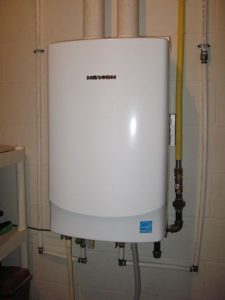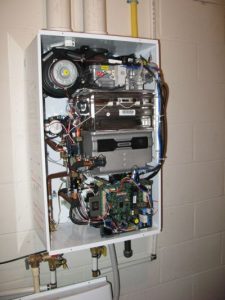Two questions we hear often about tankless water heaters are: Is a tankless water heating system right for my home? and Will it really save me money?
Two great questions we will address later, but first, let’s talk about how a tankless water heater works.
What is a tankless water heater and how does it work?
 A tankless water heater provides hot water virtually on demand. Turn on the hot water spigot, and enjoy warm or hot water – in only a fraction of the time normally associated with traditional hot water heaters that rely on storage tanks. Tankless water heaters are also known as “Demand” or “Instantaneous” water heaters.
A tankless water heater provides hot water virtually on demand. Turn on the hot water spigot, and enjoy warm or hot water – in only a fraction of the time normally associated with traditional hot water heaters that rely on storage tanks. Tankless water heaters are also known as “Demand” or “Instantaneous” water heaters.
How does it do that?
Cold water runs through a pipe to the water heating unit. Either a gas or an electric element heats the water. No waiting for a storage tank to fill with enough hot water to deliver it to your location…which means less water wasted at the tap!
Another benefit of a tankless water heater is that you don’t experience the energy losses associated with water that has been heated and is now cooling in a tank. This is known as a “standby energy loss.”
What are the benefits of a tankless water heater? Are there any downsides?
As with any energy-efficient product, there are pros and cons associated with a tankless water heater.
Top benefits include virtually on-demand warm or hot water. Almost no waiting. No wasting water waiting for it to reach your desired temperature. No paying for utility costs associated with energy losses. And, with a tankless water heater, you can enjoy a virtually endless supply of hot water.
Many tankless water heaters also have a life expectancy of 20+ years, and easy-to-replace parts can extend their lifespan.
An important downside to consider is overall household demand. It’s important to select a heater that is “right sized” for your home and needs. Some models are too small to handle multiple demands. An example would be taking a shower and running a load of laundry at the same time. There are large, whole-house units that can handle larger loads, but they often are much more expensive than regular hot water heaters of a similar capacity. Just make sure you are choosing wisely.
Traditional vs. Tankless Water Heaters: How To Choose
That’s where your trusted HVAC contractor comes in handy. Select someone who will take the time to talk to you about your needs, and assess the type of unit that will meet your immediate and long-term applications.
Consider the following:
- How does my family use hot water? Do we often run more than one type of hot water appliance at a time?
- Why are we considering a tankless unit? Is it for the long-term cost benefit? Are we making an environmental decision?
- Are there other places in my home that make sense for a tankless? Is an outside kitchen, pool shower, or pool house a good place to consider such a unit?
- Also be sure to ask the contractor you’ve selected what the long-term maintenance requirements are, so you can keep your unit running at peak efficiency.
Installing a Tankless Water Heater: DIY vs. Plumber
 Can you install a tankless water heater yourself, without the help of a contractor? In some cases, yes. But first find out if you need a permit and if there are local water heater installation codes to which you must adhere. If you are running gas lines to the heater, you may want to call in a professional plumber.
Can you install a tankless water heater yourself, without the help of a contractor? In some cases, yes. But first find out if you need a permit and if there are local water heater installation codes to which you must adhere. If you are running gas lines to the heater, you may want to call in a professional plumber.
And don’t forget to check for federal tax programs that you may be able to participate in. Some tankless water heaters may qualify for rebates or credits.
Tankles Water Heater Installation near Denver, PA
At Cocalico Plumbing & Heating, our team of experienced plumbers can install both traditional and tankless water heaters. We serve homeowners in Lancaster, Lebanon, and Berks counties, and we offer 24 hour emergency plumbing repairs. Call today at 717-738-0760 or use the form on this page to request a free quote for a new water heater.
